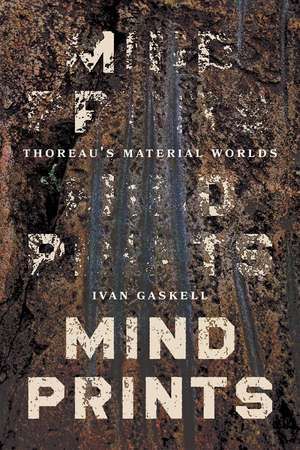Mindprints: Thoreau's Material Worlds
Autor Ivan Gaskellen Limba Engleză Hardback – 22 noi 2024
Though we may associate Henry David Thoreau with ascetic renunciation, he accumulated a variety of tools, art, and natural specimens throughout his life as a homebuilder, surveyor, and collector. In some of these objects, particularly Indigenous artifacts, Thoreau perceived the presence of their original makers, and he called such objects “mindprints.” Thoreau believed that these collections could teach him how his experience, his world, fit into the wider, more diverse (even incoherent) assemblage of other worlds created and re-created by other beings every day. In this book, Ivan Gaskell explores how a profound environmental aesthetics developed from this insight and shaped Thoreau’s broader thought.
Preț: 251.70 lei
Nou
Puncte Express: 378
Preț estimativ în valută:
48.17€ • 50.23$ • 40.03£
48.17€ • 50.23$ • 40.03£
Carte disponibilă
Livrare economică 28 februarie-14 martie
Preluare comenzi: 021 569.72.76
Specificații
ISBN-13: 9780226836072
ISBN-10: 022683607X
Pagini: 240
Ilustrații: 10 halftones
Dimensiuni: 152 x 229 x 23 mm
Greutate: 0.45 kg
Ediția:First Edition
Editura: University of Chicago Press
Colecția University of Chicago Press
ISBN-10: 022683607X
Pagini: 240
Ilustrații: 10 halftones
Dimensiuni: 152 x 229 x 23 mm
Greutate: 0.45 kg
Ediția:First Edition
Editura: University of Chicago Press
Colecția University of Chicago Press
Notă biografică
Ivan Gaskell is professor of cultural history and museum studies at Bard Graduate Center, New York City. He is the author or editor of several books, most recently Paintings and the Past: Philosophy, History, Art.
Cuprins
List of Illustrations
Preface
Chapter One: Worlds
Chapter Two: Migrants
Chapter Three: Buildings
Chapter Four: Shelter
Chapter Five: Artistry
Chapter Six: Collections
Chapter Seven: Sounds
Chapter Eight: Conclusion
Acknowledgments
Notes
Index
Preface
Chapter One: Worlds
Chapter Two: Migrants
Chapter Three: Buildings
Chapter Four: Shelter
Chapter Five: Artistry
Chapter Six: Collections
Chapter Seven: Sounds
Chapter Eight: Conclusion
Acknowledgments
Notes
Index
Recenzii
“‘I have travelled a good deal in Concord,’ Thoreau wrote in Walden, famously mocking the notion that travel takes place beyond the borders of one’s hometown. Devotees of the transcendentalist philosopher will be grateful that, nearly two centuries later, Gaskell took up residence in the adjacent town of Lexington and fixed his uncommon powers of perception on his erstwhile neighbor’s life and writing, traveling imaginatively with Thoreau to yield this extraordinary book. Gaskell unsettles and expands our understanding of Thoreau by homing in on the sensory particulars of his surroundings, cherished revelations of worlds past, present, and still to come.”
“By situating Thoreau’s wide-ranging writings in their cultural, historical, and biographical contexts, Gaskell brilliantly illuminates the critical role that perceptual acuity and aesthetic sensibility played in his management of daily life, ethical commitments, and philosophical thinking. Gaskell’s meticulously crafted account makes Thoreau come alive as someone who practiced and lived his philosophy. The book is timely and pertinent today as we face global challenges posed by environmental crises and consumerism.”
“Louisa May Alcott’s observation that Thoreau ‘made one small spot a continent’ could apply as well to this book. Gaskell’s study moves outward from the physical spot on earth that Thoreau inhabited to the virtual continents he embraced through mindprints, common things and experiences that ‘projected human presence across the ages.’ In the process of unpacking Thoreau’s contributions, Gaskell also pushes the study of aesthetics from a narrow focus on ‘the arts’ to an embrace of sensory engagement of all sorts. This is a magical book on an enduring topic.”
“I’ve often wondered what a properly transcendental history of material culture might look like, and thanks to Gaskell’s Mindprints, I now know. Through carefully chosen examples of Thoreau’s distinctively subjective empiricism, Gaskell gives the reader profound means to consider Thoreau’s perpetual, heartfelt question: why do just these things make a world?”
